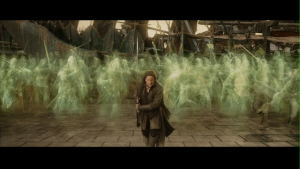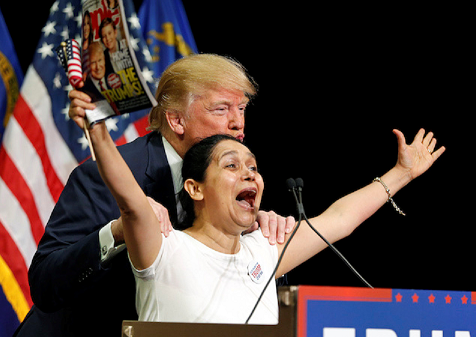I haven’t talked about my old Cold War mentor Moses Sands in a few years. He moved to the higher pastures, and I mean that literally, in 2006. But back in 1998 he wanted me to help write a book about what the Constitution meant to the American common man and woman. He said he left Americans to their own devices in the 1960s because he believed they had they had mastered the Constitutional blueprint of building and passing on their House, thus keeping the idea of freedom new and fresh for future generations.
With the advent of the Clintons in the 90s he changed his mind.
I argued with him, “But those people won’t read it, Moses. They don’t read. Even Rush Limbaugh can only reach a few of them. CBS-NBC-ABC almost none. They aren’t interested in politics. And the entire political structure of America is based on that single fact. They don’t pay attention.”
“But they will once they know what they’re losing it all.” Moses argued back.
Well, whatever they were losing back in ’98 they’re losing tenfold now. And yes, they know it.
That book never got written, but the fact remains, the majority of Americans neither read, watch or listen to national opinion news. They pick it up in saloons, in corner conversation, and these days, probably Facebook. What they do read is Jack Reacher novels, the obits in the “Weekly Thunderstorm”, while they watch almost as many old episodes of “Laramie” and “Blue Bloods” as they do “Walking Dead”. With this in mind, their voting habits had been engraved in both Democrat and Republican voting strategies since Reagan…only for different reasons, as we found out, when after 2012 it became obvious they were never interested in what Mitt Romney had on his mind, nor for that matter, Barack Obama, at least until Obamacare Episode 3 kicked in early 2013, or Benghazi kicked in, same time frame, or suddenly that we’d sent 4500 men to die in Iraq for no apparent good reason.
Only since then have things begun to fuse.
As I wrote several weeks ago, Donald Trump didn’t find this lost army. They found him, because for a few years at least, they had been looking for a new kind of leader. And while Trump did and said a lot of bodacious things, he also went to a lot of places Republicans hadn’t visited for 50 years at least, and spoke to people Republicans hadn’t spoken to in three generations. And he struck a chord.
Listen to what America’s principal corporate fat-cat hater, Michael Moore, had to say about a recent Trump visit to Detroit, into the belly of the corporate beast:
Coming from that corporate environment back in the Reagan era, when it was first transitioning to the global colossus it has now become, I’ve been able to recognize that what Trump did to capture the people’s attention was to use a language in addressing his audiences that they instinctively recognized as coming from one who understood them. He didn’t talk down or over them. He was not those “other guys”.
In dealing with people, Trump has been more reminiscent of the first generation of my own company, where the founder, and then the next generation of chosen successors, all knew virtually every front-line production worker. By name.
Working people instinctively understand this kind of man, and while a billionaire, it’s pretty clear that Trump has met, and spoken with virtually every staff member of his several properties.
So his connection is real….and is so real and so huge it doesn’t matter that no Democrat on the other side, or the media, or even conservative pundits (a term needing to be defined), knows that he is for real.
And lethal.
Trust me on this account.

I could write a book on the transformation of the American corporate “organization man” since the Reagan era. This new type of corporate worldview was already abroad in the land before Reagan, and in many ways Reagan threw down stumbling blocks to its progress with his tax cuts that empowered a whole new class of entrepreneurial small business class. That wasn’t supposed to happen.
To understand this transformation, think of the company and brand Walt Disney built, where its founder knew every employee…by name…and was a master of imagery and imagination and art, then, two generations later, a man named Michael Eisner, who couldn’t draw a circle, took over Disney in 1984 (mid-Reagan). And while he had some profitable years, he mainly changed the company from producing family entertainment to producing money, which seems to be all giant corporations seem to pursue, and the perquisites that comes with that…men and women building on the imagination, risks, and entrepreneurship of giants many years before them.
Why this is important to distinguish is that the displacement of factory workers, from robotics to cheaper off-shore labor markets, was a problem corporate leaders had to deal with in the 1980s. And they cared. In the Reagan years they dealt with problem first as a human problem. It was part of their calculation.
Labor intensive textiles, my industry, were hit especially hard, since, in smaller towns there were fewer small business jobs to transition to, especially in two-income families. So, many families moved, following population shifts that had taken place over the past century every time there was a major technology change.
Various strategies were tried, all depending on the rather quaint ideas the early captains of industry had about the human cost. The bottom line was just one line they had to consider. But those considerations went by the board in the 1990s. So what changed in the early 90s wasn’t the workers caught up once again in a seismic change, but a new generation of corporate leaders and their worldview vis a vis government and the workers in general.
In my ten-year foray into corporate management I noted a sharp difference in the attitudes of my generation and the younger bureaucrat managers hired to staff and run the company from a newly built central HQ. None of these men and women had ever been in a factory, and visited as little as possible, and knew nothing of the actual product(s) being made, except what you might see in television ads. Marketing value. And worse, they spoke with open contempt of the last dragons of the original company, from the late 40’s, who they called derisively “manufacturers”, hoping they would soon retire, which they finally did around 1990.
That was when I left, too, because that new generation who would inherit the company had attitudes about not only the workers, but the on-site factory mangers, that were elitist and class-based. They spoke of plant managers in terms of “you can train monkeys to do his kind of work”, and designed the growing information systems to produce just that sort of on-site management environment. They looked upon the workers as “units of production”, just as that classic 1927 silent film, “Metropolis”, portrayed the robotic new man. Where did they learn this sort of outlook, I wondered?
(A different case in point, I was hired in the mid-90s to ship some container loads of industrial factory products of a well known brand to South America, this company having been recently purchased by a corporation in Germany, their US office in Pittsburgh. The foreman on the loading dock had been with the company for 25 years. A single pallet of material was in the way on the floor, blocking the loading, and after much embarrassment the shipping foreman admitted he had to get permission from Pittsburgh to move that pallet approximately six feet, out of the way. 25 years on the dock, in charge for over fifteen, this man now had to humble himself and ask permission from a tech-weenie in Pittsburgh to move a 200 lb pile of crap 6 feet.)
Now I have just outlined a problem in the American corporate culture that been around for over 35 years, and has likely metastasized, which may explain this new world order alliance between giant corporations whose main object is money and control, and only secondarily the products invented and branded 50 years ago by some guy named Disney, (and which you can hire a monkey to produce) and a new type of government, thanks Barack Obama and both Clintons, that is more fascist in aspect than Marxist….which probably explains why an old enemy of mine, Michael Moore, would wake up and smell the same coffee as I do now.
Obama is of the same generation of elitist MBA’s I encountered in the early 80s. Where they got that from was likely business schools and law schools teaching in tandem an elitism-based ideology having nothing to do with business or law. What we do know is that at a time when the small business sector might have served as a release valve for many of those who lost jobs in manufacturing, Obama intentionally drove almost 20% of the small business sector companies and their jobs, out of business, while opening the borders to unskilled cheap laborers from the South and elsewhere to deny those employees even the most meager forms of employment.
I still haven’t come up with a unified theory as to why. Mean-spirited? Cynical? Indifferent? Probably a splash of each. Undoing and repairing it will be a complex endeavor taking a generation to undo, but beginning it must start with a heavy spoonful of humility and ipecac, so that we can then slap the elitism right out of their mouths. Donald Trump can do that, for sure.
That Lost Army has found Donald Trump, and it is time now for them to seek their justice.




